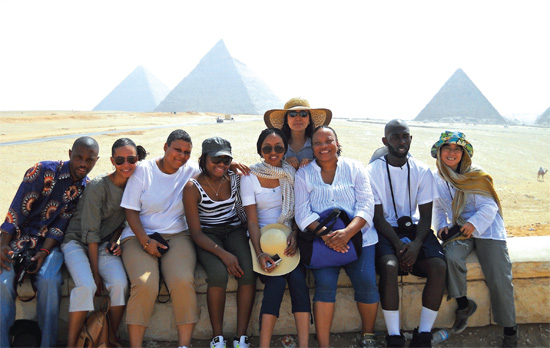- Posted in All University
- Category: Campus News
Students in the spring Horace Mann Bond Honors Program course titled Select Nile Valley Dynasties will participate in a twoweek long Egypt study tour this fall.
The study abroad opportunity emphasizes the native African origins of Egypt and its contributions to the roots of all world religions. The tour aims to offer students a new appreciation for the ancient sources of
African history, says D. Zizwe Poe, a professor of history, political science and religion, who also teaches the course and directs the Horace Mann Bond Honors Program.

Study abroad travelers in August 2010: Nosakhere Griffin-El ’05, Ashley Gabb ’08, Caroline Hicks, Sherrye Giggers ’10, Ayana Berridge, Suzuko Morikawa, Evelyn Poe, Hakim Fulmore ’13, and Sachi Nakachi. Photo by D. Zizwe Poe.
“The students in the class were some of the best students matriculating at this University,” Poe says. “During the semester, students [were] learning about 30 different Hieroglyphs [the Ancient Egyptian formal
writing system combining logographic, syllabic and alphabetic elements].” That lesson in particular intrigues many students.
“This course has changed my perspective in regards to written language and the value of history,” says Thembisile Gxuluwe, a South African native from Pittsburgh who graduated in 2017 with degrees in Pan Africana studies, sociology, and anthropology. “The written language of ancient Kemet differs strikingly from any language I have ever seen. I find it breathtaking that the language uses symbols instead of words.”
During the study tour portion, Poe explains students will visit the Great Pyramid of Giza, the Sphinx, the Imhotep Museum, the Temple of Karnak, the Valley of the Kings and the Valley of Queens, Abu Simbel, and the Temple of Ramses.
He adds they will also visit the temple for Nefertari, who was the first of the Great Royal Wives, or principal wives, of Ramses the Great, (not to be confused with Nefertiti), and the temple for Hatshepsut, who was the second female pharaoh in Egypt, was the greatest historically. Hatshepsut assumed the throne in 1478 B.C.
While Poe has organized and guided other Egypt study tours for university students, faculty, and administrators, this is the first time he will lead one as an official component to one of his courses.
“I have always wanted to see Africa with my own eye but never had a means to do so, through this class I get a chance to witness the birthplace of human civilization, says another student, Nijewel Holliday, a junior biology major in the class. “I also would like to have to have an eye-opening experience while there and [gain the] ability to better understand today’s problems by looking at the problems [of ] the past. I will inspire other students to take the class and go see Egypt so that they may understand fully about their origins.
Last year, a select group of First Year Experience students participated in a month-long, faculty-led study abroad opportunity in Burgos, Spain. Burgos is the town where the merchants raised money so that Isabella and Ferdinand could fund Christopher Columbus’s voyage.
Poe says students earned a total of nine credits while taking an introductory Spanish course and a course in Spanish culture.